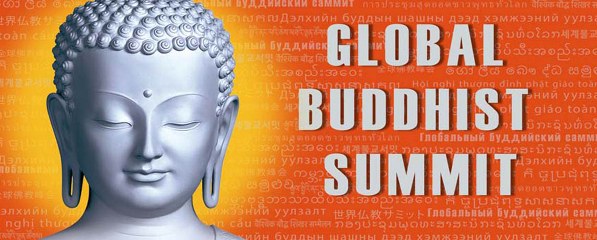Global Buddhist Summit to address Contemporary Global Challenges
 The International Buddhist Confederation, (IBC) supported by the Indian Ministry of culture, will be hosting the Global Buddhist Summit (GBS) on 20-21 April at the Ashok Hotel. The aim of the conference is to focus on a Buddhist response for dealing with the most pressing challenges the world is facing.
The International Buddhist Confederation, (IBC) supported by the Indian Ministry of culture, will be hosting the Global Buddhist Summit (GBS) on 20-21 April at the Ashok Hotel. The aim of the conference is to focus on a Buddhist response for dealing with the most pressing challenges the world is facing.
The IBC, a global Buddhist umbrella body, headquartered in New Delhi along with the Ministry of Culture and the Ministry of External Affairs, recently held a successful international meet of experts from the Shanghai Cooperation Organization (SCO) nations on shared Buddhist Heritage in order to re-establish trans-cultural links, seek out commonalities, between Buddhist art of Central Asia, art styles, archaeological sites and antiquity in various museums’ collections of the SCO countries.
The GBS-2023 is a similar effort towards engaging the global Buddhist hierarchy on matters of Buddhist and universal concerns, and to come up with policy inputs to address them collectively. The theme of the two- day Global Buddhist Summit is “Responses to Contemporary Challenges from Philosophy to Praxis”.
Eminent scholars, Sangha leaders and Dharma practitioners from all over the world will discuss today’s pressing global issues and look for answers in the Buddha Dhamma (in Pali) or Dharma (in Sanskrit) that is based on universal values.
The discussions will fall under the following four themes:
1. Buddha Dhamma/Dharma and Peace
2. Buddha Dhamma/Dharma: Environmental Crisis, Health and Sustainability
3. Preservation of Nalanda Buddhist Tradition: it is here that knowledge and culture flourished of diverse spiritual and philosophical traditions.
4. Buddha Dhamma/Dharma Pilgrimage, Living heritage and Buddha Relics: a resilient foundation to India’s centuries-old cultural links to countries in South, Southeast and East Asia.
Religious Traditions that have originated in India are part and parcel of the ‘Ancient Dharma, the eternal way of life’ and that the addition of ‘ism’ in Buddhism, coined by Victorian Indologists takes it towards a doctrine and less as a philosophical tradition based on the teachings of the Buddha. Hence, it is preferable to use ‘Buddha Dharma’ instead of Buddhism. Buddha Dhamma/Dharma in ancient India made significant contributions to the development of human civilization. Its spread to the world led to a great churning of knowledge and cultures and flowering of diverse spiritual and philosophical traditions the world over.
It is expected that the deliberations will explore, as to how the Buddha Dhamma’s/Dharma’s fundamental values can provide inspiration and guidance in contemporary settings which drives technological advancements and consumerism yet grapples with a devastated planet and rapid disenchantment of societies.
The prime vision of the Summit is to look into the teachings of the Buddha that have been continuously enriched over the centuries with the practice of Buddha Dharma. The aim is to set up a forum for the lay Buddhist scholars and Dharma Masters. It will also delve into Buddha’s message for Peace, Compassion and Harmony with the objective of working towards Universal Peace and Harmony, in accordance with the core values of Dharma and produce a document for further academic research, to study its viability for use as a tool for the conduct of international relations on the global stage.
The Buddhist Channel
Source: buddhistchannel.tv

